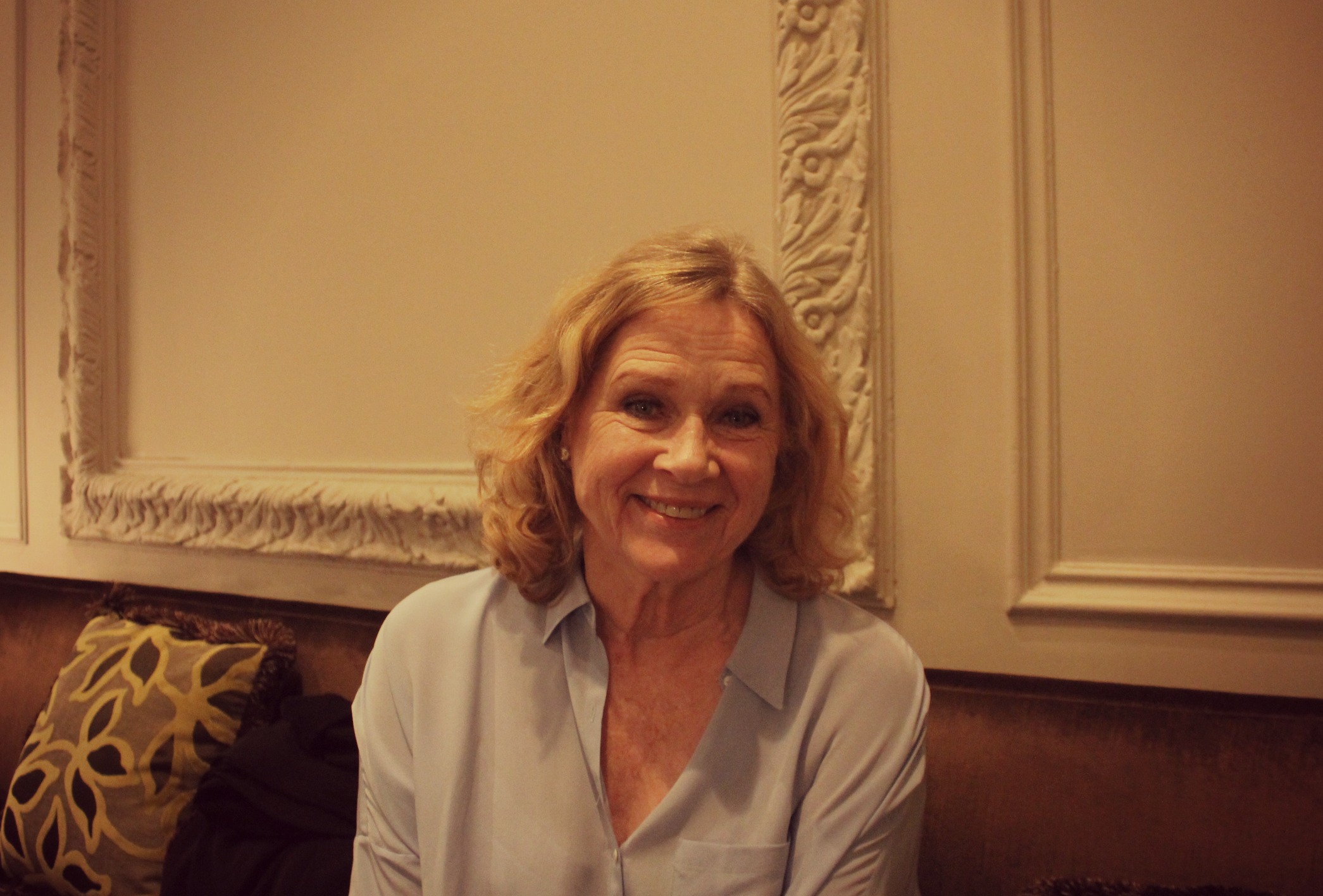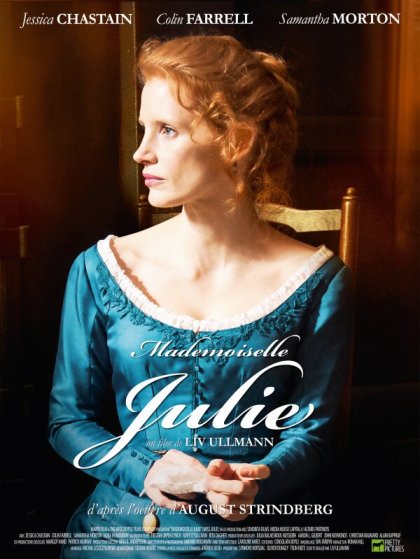Jose here. The first thing I tell Liv Ullmann is that I remember being ten years old and having my father introduce me to the work of Ingmar Bergman.

That Swedish legend directed her in more than ten films including Persona, Cries and Whispers, and Face to Face for which she was nominated for the Best Actress Oscar. She offers me a warm smile, touches my shoulder and says “oh, thank you”. During our conversation I realize how much she “talks” with her hands, which she uses to draw figures on a table, to mimic camera moves and also to touch her face in an expression of awe, as she talks about the work of the actors she directed in her adaptation of August Strindberg’s Miss Julie (opening today in NYC).
She hadn’t directed a film in almost fifteen years (since 2000’s Faithless), but was compelled to return behind the cameras when she was given carte blanche by producers who asked her to make a film about a femme fatale. She chose Strindberg’s classic because she felt there was much that still hadn’t been said about the title character. As played by Jessica Chastain Miss Julie is a rebellious soul who pretends to be in control, but has little self awareness. She finds her true self through the way she treats her servants John and Kathleen, played by Colin Farrell and Samantha Morton respectively.
 Ullmann moved the story to 1890 Ireland where she felt the socio-economic inequality between the characters made more sense than in Sweden. She unleashes the three characters in a castle straight out of the most existential version of Hamlet and infuses the text with color, both literal and figurative, to make the most compelling version of Miss Julie to be put on screen, a tribute to Bergman, Strindberg and a reminder that Ullmann’s work both behind and in front of the camera is always a pleasure to watch. She talked about her cast with passion, explained her thoughts on conveying physical space on film. And she even talked some Carrie Bradshaw! [after the jump]
Ullmann moved the story to 1890 Ireland where she felt the socio-economic inequality between the characters made more sense than in Sweden. She unleashes the three characters in a castle straight out of the most existential version of Hamlet and infuses the text with color, both literal and figurative, to make the most compelling version of Miss Julie to be put on screen, a tribute to Bergman, Strindberg and a reminder that Ullmann’s work both behind and in front of the camera is always a pleasure to watch. She talked about her cast with passion, explained her thoughts on conveying physical space on film. And she even talked some Carrie Bradshaw! [after the jump]
JOSE: If I’m not mistaken at some point you were going to play Miss Julie?
LIV ULLMAN: No, I never said I wanted to play her, maybe they printed that, but I have never played her or any Strindberg for that matter. I wasn’t very interested in Strindberg, I did a lot of Ibsen, but I didn’t care much about Strindberg until I did A Streetcar Named Desire in Washington, NYC and Australia with Cate Blanchett. Tennessee Williams was so obsessed with Miss Julie and stole a lot from it, so then I read it and thought it was very interesting. So when I was offered to make a movie and write a screenplay about whatever I wanted, I asked if I could adapt Miss Julie, and they said yes.
JOSE: I’ve seen other adaptations of Miss Julie and read the text, but it wasn’t until I saw your film, that I realized how mistreated this character has been by male directors, who truly make her seem like a terrible person. However you turn that around in your adaptation…
I love that you’re saying that, because I feel the same way. I knew I wanted the film to be about what happens when we don’t listen to each other, I wanted to say what class is about and also that Miss Julie is unable to love a man regardless of his class, because she has no way of relating to another human being. Reading what August Strindberg wrote about women and this character made me realize he hated women, he even said so himself. He’s also written wonderful plays, so in an adaptation I wanted to give some of the thoughts I think Miss Julie had that Strindberg didn’t give her. She says “sometimes I feel like I’m nothing” and she tells stories about how we are all a part of everything, and suddenly out of nowhere, there’s this openness and I believe if she had really listened to John and he had listened to her, maybe they could have been a wonderful couple. But I think that he listened more to her than she to him, because she can’t break out of her isolation. I saw the 1951 film adaptation and it made me ask myself what was it about. Miss Julie is about these three people trying to reach out to each other, but the only one who I think believes in class is Kathleen who is the only one who can really make a choice about compassion even when things haven’t always been in her favor. She wipes Miss Julie’s face and tries to connect her to the Bible.
The film does feel like you’re actually having a dialogue with Strindberg. You’re telling him that you respect his text but that his ideas on womanhood were quite wrong.
Yes, at times I felt like I was really sitting with Strindberg and having a conversation with him. I think what I did with the text was OK and I don’t think he would be angry at me, because I haven’t changed the essence of the play. I wanted him to know what a woman feels.

You’re also kinder to Colin Farrell’s character.
I feel like what he does is wonderful, because many other actors who have played that part have played him like this macho, rude guy and Colin isn’t like that. Miss Julie is coming down into his kitchen where he is used to be the boss and she’s ordering him around, and he rejects her without being rude, but he can’t hide the stiffness in his body and the horror of him not being the master anymore. He allows himself to play the part as a man who is not a macho but is still in command of his domain, he’s also wonderfully comic when he has a confrontation with Kathleen. Colin plays him like a man who is always trying to make the right choice, even though he always ends up making the wrong ones.
The way you use space in the film made me think a lot of the way Ingmar Bergman used space. We get a sense that by the end of the film we know this castle. which is something movies often forget how to do.
I know. We were lucky, because we were supposed to do the film on a set but we didn’t have the money, so I found this castle that had everything we needed. A tunnel through which the servants moved so that the people upstairs wouldn’t have to see them, the kitchen and the servants’ bedrooms were also underground, so outside their windows you didn’t see nature but walls. You have to use these spaces to show where these people were coming from. We also had the staircase for example, that represents social mobility and how John dreams of going upstairs, and by the end finds himself going upstairs only to serve his master, while Julie who dreamt of going downwards ends up using this tunnel to fulfill her destiny where she loses everything. The space made it easy for the camera to come really close (she moves her hand towards my face) and capture their fears and insecurities, which is why film has an advantage over theater. I also gave them words that Strindberg might have thought of but never gave them, and these words are also “close ups”, they allow us into their thoughts. I had a wonderful cinematographer, who is a true master of light, and also respected my frames, because I feel the director must make the frame.

I’m curious about your casting because both of the actresses in the film reminded me of Cries and Whispers. Samantha Morton looks just like Kari Sylwan who played the maid Anna in the film, and Jessica looks just like you when you were young. Was that film on your mind at all?
No it wasn’t, but then again, we don’t know what’s on the back of our minds. I was not aware that I looked like Jessica but once we started she told me that the director of the movie she’d just made, his name escapes me, told her she looked like “a young Liv Ullmann”, and then when I saw pictures of her in makeup I thought it could’ve been me years ago. As an actress she’s very different than me, when the camera was there she made choices I wouldn’t have made but they were all fantastic. That scene with the bird for example, her solution there was incredible and it made me lose it, when the camera stopped I started to cry too. With Samantha, the moment we started I felt she was Anna. She came into the film to show compassion where her character had been so wronged, which is what Ingmar showed in Cries and Whispers in that scene where Anna nurses the sick woman.
Jessica Chastain is a prodigy but her directors rarely give her the opportunity to play sexual characters and in your film we have this amazing scene where Julie becomes aware of her body, and it was as if we were watching Jessica become a sexual being for the first time onscreen.
She was allowed to do it this way, because I didn’t want to show Julie and John making love, but I wanted to show what came afterwards, because at the beginning you see how unsure she is, she doesn’t know quite how to hold him. Jessica is fantastic, I am so upset that this is such a small movie and I don’t know what will happen to it, but she should get an Oscar for this. But how do you get an Oscar for such a small movie? I think this is the best thing she’s done this year.

You’ve also worked with Cate Blanchett who is one of the greats…
Cate Blanchett, oh my god. I would work with her and Jessica again tomorrow and there’s one more actress who I want to work with, Kate Winslet. She is just real. Real.
Miss Ullmann, please satiate my curiosity, Sex and the City is my favorite show and I heard at one point you were offered a part in it.
(Laughs and covers her face) Yeah, that was crazy! They asked me to be in the last two episodes where Carrie was going to Paris to meet Baryshnikov and they asked me to play his ex-wife and I said “no! Have they seen me? They’ll die when I get off the plane”. I said no only because I didn’t want them to be disappointed, I’m sure they had seen pictures of me in my youth. I loved Sex and the City, I loved it! I would have given my arm to be in it, but I didn’t want them to be shocked when they saw me.

More Miss Julie | More interviews | More Cries and Whispers